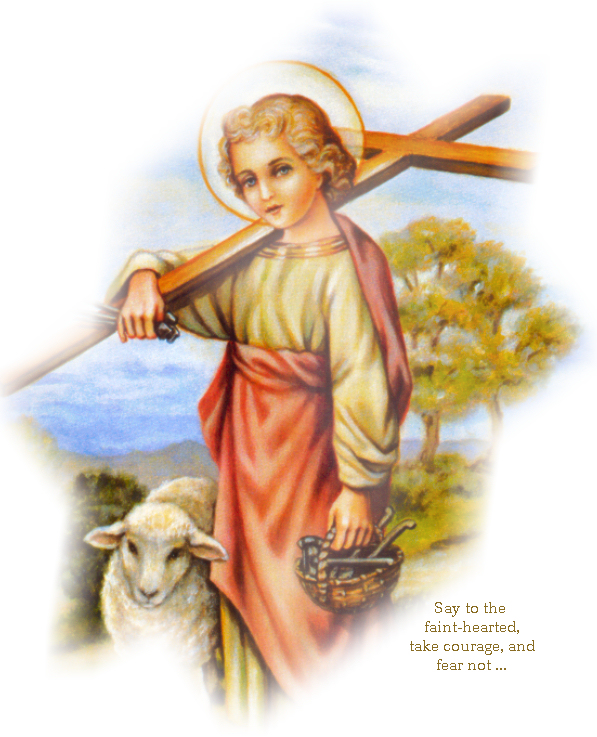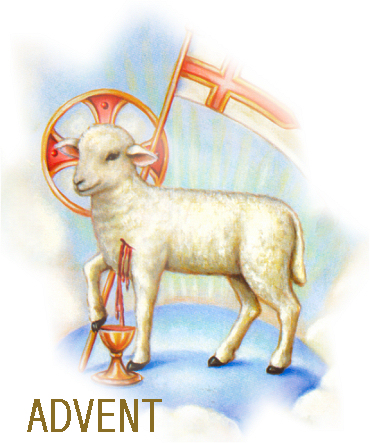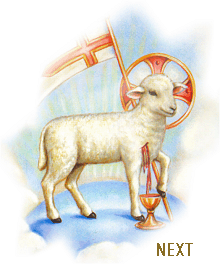

DISCOURSES FOR ADVENT
Taken from THE INCARNATION, BIRTH AND INFANCY OF JESUS CHRIST
by St. Alphonsus Liguori
THE REDEMPTORIST FATHERS
1927
With Nihil Obstat and Imprimatur
DISCOURSE IV
The Eternal Word From Being Innocent Becomes As It Were Guilty
Part 1
Consolamini, consolamini, popule meus, dicit Deus vester.
"Be comforted, be comforted, my people, saith your God."---Isaiah 40:1
Previous to the coming of our Redeemer, the whole unhappy race of mankind groaned in misery upon this earth; all were children of wrath, nor was there one who could appease God, justly indignant at their sins: Behold, Thou art angry, and we have sinned: ...there is none that riseth up, and taketh hold of Thee. [Isaiah 44:5] Yes, because it is God Himself Who has been offended by man: man, being nothing but a miserable creature, was unable, by whatever extent of chastisement, to make atonement for the injury offered to an infinite majesty: there was need of another god to satisfy the Dine justice. But such a god did not exist, neither could there be found any besides the one God alone: on the other hand, the Person offended could not make satisfaction to Himself; so that ours was a desperate case. But take comfort, take comfort, O men, saith the Lord by the mouth of Isaias: Be comforted, be comforted, My people, saith your God; for her evil is come to an end. [Isaiah 40:1] And the reason is, because God Himself hath discovered a way of saving man, while at the same time His Justice and His mercy shall both be satisfied: Justice and peace have kissed. [Ps. 84:11] The Son of God has Himself become Man, has taken the form of a sinner, and loading His Own shoulders with the burden of satisfying for mankind, He has made full compensation to the Divine justice for the penalty merited by men, by the sufferings of His life and of His death; and thus the opposite claims of justice and of mercy have been paid.
Has Jesus Christ, then, from being innocent become guilty, to free men from eternal death? That is to say, has He chosen to pass for a sinner? Yes, the love which He bears to mankind has brought Him even to this pass. Let us consider Him in this state; but let us first beg light of Jesus and Mary to profit by it.
What was Jesus Christ? He was, answers St. Paul, holy, innocent, undefiled. [Heb. 7:26] He was, to speak more correctly, sanctity itself, innocence itself, purity itself, since He was true Son of God, true God as His Father; and so dear to that Father, that the Father there on the banks of the Jordan declared, that in that Son He found all his complacency. But this Son being bent upon freeing mankind from their sins and from the death incurred by them, what did He do? He appeared to take away our sins, says St. John. [1 John 3:5] He presented Himself before His heavenly Father, and offered Himself to pay for mankind; and then the Father, as the Apostle tells us, sent Him on earth to be clothed in human flesh, to take the appearance of sinful man, and to be made in all things like to sinners; God sending His Own Son in the likeness of sinful flesh. [Rom. 8:3] And then St. Paul adds; And of sin hath condemned sin in the flesh. And by this he means, according to the explanation of St. John Chrysostom and Theodoret, that the Father sentenced sin to be dethroned from the tyranny which it exercised over mankind, by dooming to death His Own Divine Son, Who, though He assumed flesh that was to all seeming contaminated with sin, was nevertheless holy and innocent.
God, therefore, in order to save mankind, and at the same time to answer the claims of His justice, was pleased to condemn His Own Son to a painful life and to a shameful death. And can this ever be true? It is of faith, and St. Paul assures us of it: He spared not even His Own Son; but delivered Him up for us all. [Rom. 8:32] Jesus Christ Himself affirms it to us: God so loved the world, as to give His Only-begotten Son. [John 3:16] Celius Rodiginus relates, that there was a certain man, called Doeotarus, who had several sons, but loved one of them more than all the rest; insomuch that in order to leave him his whole fortune, he had the monstrous cruelty to murder all the others. But God has done quite the reverse; He has slain His well-beloved Son, His only Son, in order to give salvation to us vile and ungrateful worms: God so loved the world, as to give His Only-begotten Son.
Let us weigh these words: God so loved the world. What? a God condescends to love men, miserable worms, that have been rebellious and ungrateful towards Him, and to love them to such an extent ("the word so signifies the vehemence of love," says St. John Chrysostom), so as to give His Only-begotten Son! that He chose to give them His very Son, and that Only-begotten One Whom He loved as much as Himself! Not a servant, not an Angel, not an Archangel did He give, but His Own Son, subjoins the same holy Doctor. But in what manner did He choose to give Him? He gave Him to us lowly, humbled, poor, despised; He gave Him into the hands of slaves to be treated as a miscreant, and even to be put to death, covered with shame, on an infamous gibbet. O grace! O force of the love of a God! exclaims St. Bernard: "O grace! O the strength of love!" O God, who would not be touched to hear of such an instance, that a monarch, to release his slave, was compelled to put his only son to death,---that son who was all the love of his father, and was beloved by him as his very self? Had not God done this, says St. John Chrysostom, who could ever have imagined it or hoped for it? "What things the human mind could never have conceived, could never have hoped for, these things He has bestowed on us."
But, O Lord, it seems like an injustice to sentence an innocent Son to die for the purpose of saving a slave who has offended Thee. "According to all human reasoning," says Salvian, "one would certainly accuse that man of outrageous injustice who should kill an innocent son in order to free his servants from the death which they had deserved." Yet no, with God this has not passed for injustice, because the Son made the spontaneous offering of Himself to the Father to satisfy for men: He was offered, because it was His Own will. [Isaiah 53:7] Behold, then, how Jesus voluntarily sacrifices Himself as a victim of love for us; behold Him, how as a mute lamb he puts Himself into the hands of the shearer, and although innocent, He comes to suffer from men the greatest ignominies and torments, without even opening His mouth: He shall be dumb as a lamb before His shearer, and He shall not open His mouth. [Ibid.] Behold, in fine, our loving Redeemer, Who to save us chose to suffer death and the punishment deserved by us: Surely He hath borne our infirmities, and carried our sorrows. [Ibid., 4] St. Gregory Nazianzen says, "He refused not to suffer as guilty, provided only that men might obtain salvation."
Who has done this? asks St. Bernard. What has been the cause of this immense prodigy? A God to die for His creatures! Who has done this? Charity has done this. This has been wrought by the love which God bears to man. The Saint pursues his meditation on the time when our amiable Redeemer was seized by the soldiers in the garden of Gethsemani, as is related by St. John: And they bound Him. [John 18:12] And then he says to our Lord: "What hast Thou to do with chains?" My Lord, he says, I behold Thee bound by this vile rabble as if Thou wert a criminal, and they are about to drag Thee to an unjust death. But, O God, what have cords and chains to do with Thee? such things belong to evil-doers, but not to Thee, Who art innocent, Who art the Son of God, innocence itself, holiness itself. St. Laurence Justinian replies that the bonds which dragged Jesus Christ to death were not those that were fastened on Him by the soldiers, but the love He bore towards men; and hereupon he exclaims: "O charity, how strong are thy bonds, by which even a God could be bound!"
The same St. Bernard goes on to consider the iniquitous sentence of Pilate, who condemned Jesus to the Cross, after several times having declared Him innocent; and then, turning himself to Jesus, he thus bewails himself before Him: "What hast Thou done, O most innocent Saviour, that Thou receivest such a judgment?" Ah, my Lord, I hear this wicked judge condemning Thee to die upon the Cross; and what evil hast Thou done? what crime hast Thou ever perpetrated to deserve such a death of torture and shame?---a death awarded to none but to the most guilty wretches? But he then resumes by replying: Ah, I now comprehend, O my Jesus! what crime it is of which Thou art guilty? It is of having loved mankind too dearly: "Thy love is Thy crime." Yes, it is this love, more than Pilate, that condemns Thee to death; because it is to payoff the penalties due from mankind that Thou hast willed to suffer death.
As the time of the Passion of our Blessed Redeemer drew near, He besought His Father that He would hasten to glorify Him, by permitting Him to offer to Him the sacrifice of His life: Father, glorify Thy Son. [John 17:5] At this, St. John Chrysostom asks, in astonishment, "What sayest Thou? Dost thou call these things glory?" A Passion and a death accompanied with such sufferings and shame, dost Thou call this Thy glory? And the Saint then replies to his own question for Jesus Christ: "Yes, since it is for My beloved ones, I esteem it a glory." Yes, so immense is the love I entertain for mankind that it makes Me regard it My glory to suffer and to die for their sake.
VIEW THE FULL POSTER IMAGE
